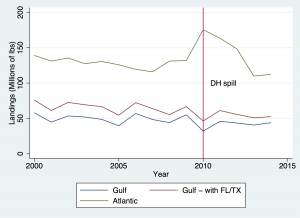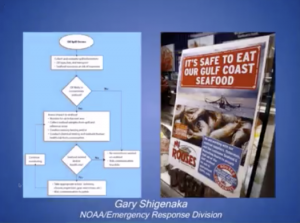Assessing the Economic Impact of the Deepwater Horizon Oil Spill on Selected Industries
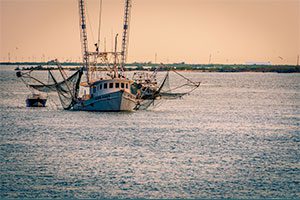
Photo by thepipe26/Flickr Fishing boat off Grand Isle, Louisiana
The Economics subteam is assessing the economic impacts of the Deepwater Horizon oil spill on Gulf Coastal communities, particularly effects on fishing, seafood processing, and tourism industries.
Using publicly available, routinely collected data on landings, revenues, and fishing effort for select fish species, researchers are examining overall impact of the DWH oil spill as well as changes that occurred over time.
Selected Findings:
What Were the Direct Impacts of the 2010 Deepwater Horizon (DWH) Oil Spill on the Commercial Blue Crab Fishery?
- We compared changes in Gulf landings following the spill to changes in Atlantic landings, and found that the spill resulted in a 75-85% decrease in landings in the months immediately following the spill, followed by a relatively swift recovery. While there is some evidence of potential longer-term impacts, we cannot estimate these effects precisely. Because of the potential for substitution between Gulf and Atlantic crab, these results represent an upper bound on the true impact.
- We also compared landings in Louisiana crabbing basins that were more versus less affected by the spill, and found a 50% drop in crabbing trips in basins that were more affected following the spill, but little impact on landings, likely because the spill and the resulting closures changed the relationship between effort (trips) and landings.
- Overall, our findings suggest that the Deepwater spill did result in substantial, short-term losses to the blue crab fishery, but that the fishery also exhibited a high degree of resilience and recovered quickly as soon as the closures were ended.
View Summary of Findings »
View Full Report »
Louisiana commercial blue crab landings and crabbing trips
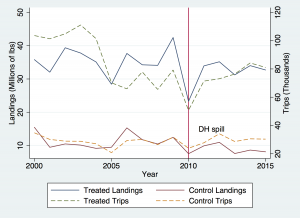 Annual commercial blue crab landings and crabbing trips in Louisiana basins defined as treatment and control, as discussed in the text. Authors’ calculations based on data provided by the Louisiana Department of Wildlife and Fisheries. The vertical line in each figure indicates the Deepwater Horizon spill in April 2010.
Annual commercial blue crab landings and crabbing trips in Louisiana basins defined as treatment and control, as discussed in the text. Authors’ calculations based on data provided by the Louisiana Department of Wildlife and Fisheries. The vertical line in each figure indicates the Deepwater Horizon spill in April 2010.
Related News
Findings Shared from Study on Economic Impact of Louisiana Land Loss
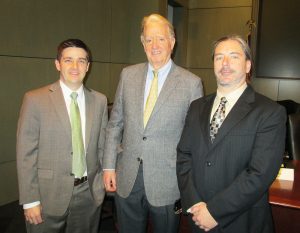 RAND’s Craig Bond and LSU’s Stephen Barnes presented findings from their evaluation of the economic effects of coastal land loss at the Governor’s Advisory Commission on Coastal Protection, Restoration, and Conservation meeting in New Orleans on December 2, 2015. Their new report, Economic Evaluation of Land Loss in Louisiana, is intended to guide coastal management decisions in the Gulf States region.
RAND’s Craig Bond and LSU’s Stephen Barnes presented findings from their evaluation of the economic effects of coastal land loss at the Governor’s Advisory Commission on Coastal Protection, Restoration, and Conservation meeting in New Orleans on December 2, 2015. Their new report, Economic Evaluation of Land Loss in Louisiana, is intended to guide coastal management decisions in the Gulf States region.
Oil Spill Science Seminar Explores Healthy Gulf Seafood
CNREP to Hold Forum on Socioeconomic Research in Coastal Systems
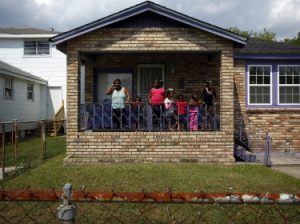 The Center for Natural Resource Economics & Policy is holding its 5th National Forum on Socioeconomic Research in Coastal Systems in New Orleans March 20-22, 2016. This triennial forum focuses on the opportunities and challenges of socioeconomic research and extension in the development and evaluation of coastal resource restoration and management.
The Center for Natural Resource Economics & Policy is holding its 5th National Forum on Socioeconomic Research in Coastal Systems in New Orleans March 20-22, 2016. This triennial forum focuses on the opportunities and challenges of socioeconomic research and extension in the development and evaluation of coastal resource restoration and management.
Consortium Members Meet Community Leaders in Bayou La Batre, AL
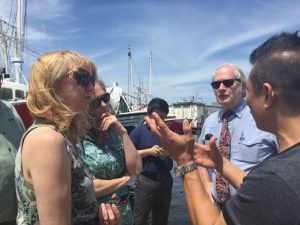 As part of the effort to build capacity for community action planning and resilience building, CRGC members from RAND Corporation and the University of South Alabama’s Coastal Resource & Resiliency Center met in Bayou La Batre—a community on the Alabama coast that is a large seafood producer for the Gulf region.
As part of the effort to build capacity for community action planning and resilience building, CRGC members from RAND Corporation and the University of South Alabama’s Coastal Resource & Resiliency Center met in Bayou La Batre—a community on the Alabama coast that is a large seafood producer for the Gulf region.

